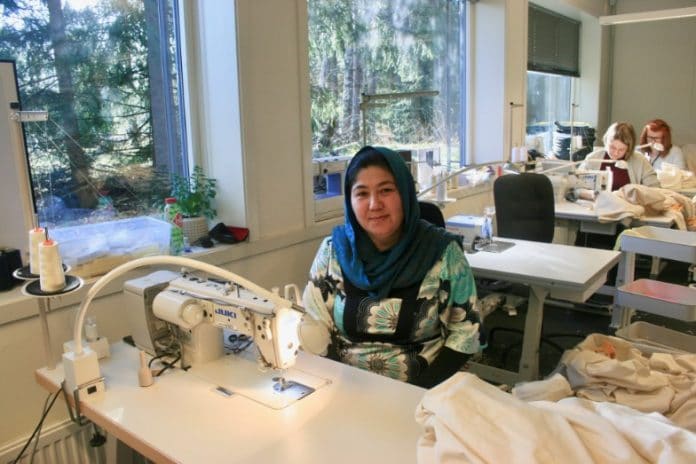The walls are covered with order sheets inside the meeting room of Sisters in Business (visit the site). The workrooms are filled with the rattling of sewing machines and boxes of folded reusable surgical gowns in cotton – ready to be shipped to health workers all over Norway who are now in the front line in the fight against the COVID-19 pandemic. The company founders, Sandra Tollefsen and Farzaneh Aghalo, are very busy these days.
“I compare the women to soldiers in war. We come from war-torn countries, so this is no match for us,” says Farzaneh and laughs.
Sandra and Farzaneh met in 2007, and together they hosted practical job courses for immigrant women. Farzaneh is from Iran and knows firsthand the many challenges a lot of immigrant women face when trying to enter the Norwegian labour market.
“Most of these women have very little formal education, very little work experience and have to shoulder most of the unpaid care work and domestic chores at home. It is not always easy to reconcile these realities with the Norwegian labour market. We wanted to do something about it,” says Sandra.
Together, they came up with the idea to create a business that took the needs of immigrant women into account. After partnering up with IKEA and Asker municipality in 2017, they established a sewing studio at the IKEA department store at Slependen, offering interior products and clothing repairs. Quickly they established another sewing studio in Asker, where they made uniquely designed aprons and corporate gifts out of leftover fabric from sustainable fashion collections.
“Behind every apron is a story – a woman and mother that has been given a new life. We have tried to communicate this story. This is what you get when you buy our products. It’s taken time to build the customer base, but we have managed to do it. We help companies become socially responsible,” says Sandra.
When the Norwegian authorities introduced strict measures to limit the spread of COVID-19 on 12 March, many Norwegian companies had to shut their doors, and Sisters in Business lost its customer base. The two founders had already told their employees they were about to be laid off, when they got an order for 100 medical gowns. Sisters in Business had never made medical equipment before but rose to the challenge.
“A gown came flying into the studio. We were told to use it as a pattern. We thought: let’s give it a week and see if we are able to make them,” Sandra remembers.
In March, Norwegian Minister of Health, Bent Høie, declared that everybody had to come together to defeat the COVID-19 pandemic. At Sisters in Business, everyone pulled together to make gowns for the healthcare workers.
IKEA donated money to buy new sewing machines. Asker municipality provided access to larger facilities, and when the seamstresses ran out of buttons, local students volunteered to 3D-print new ones.
At a time when many companies had to lay off their employees, Sisters in Business have hired three new seamstresses to meet the need for medical gowns. Now the total staff consists of 14 women – most of whom are immigrants and come from Afghanistan, Algeria, Iran, Pakistan and Somalia. Everyone has undergone a one-year training period. For some, this presented a great challenge as they had never sewn or held a pair of scissors before.
“Just think about it! These women have always had to take a backseat. Now they are in the frontseat. They participate in one of the most important communal efforts of all time,” Sandra says proudly.
One of them is a mother of six, Zainab Mohsini. Now that she is a vital part of Norway’s communal effort to defeat COVID-19, her husband takes care of the children and the domestic chores.
“My children are very proud. Not just of me, but all the women. They help me get to work on time,” Zainab smiles and continues: “If I can help society with my little needle and thread, why shouldn’t I?”
The two founders have been asked why they won’t hire any “brothers”, but as Farzaneh explains “You can be free here. You don’t have to wear your hijab.”
Sisters in Business takes the Government’s recommendations very seriously. They uphold physical distancing, clean the sewing machines several times a day, avoid sharing equipment like scissors and measuring tape, and wash their hands frequently. The workplace functions as the employees’ social network, and the women look out for each other as if they were part of one big family. Sandra and Farzaneh consider Sisters in Business to be a family business.
“We support them every day. Some employees can’t read or write. I help them fill out their paperwork. They know they’ll receive help here. Here we have a sisterhood,” says Farzaneh.
“We can’t go back to the way things used to be”
Though many people these days choose to work from home and self-isolate, the seamstresses are not afraid of going to the sewing studio.
“I’m not afraid. I’m proud. I follow the recommendations, sit on the empty bus and look forward to going to work everyday,” says Fatima Melala, a mother of seven.
“When you come from countries that have experienced even worse things, COVID-19 isn’t that big a deal. I’m not very anxious. Life must go on,” Farzaneh says.
Norway no longer has a textile industry of its own, and has to import most of its products from abroad. The COVID-19 pandemic exposes the dangers of such dependency on imported goods. Sisters in Business hopes the pandemic will lead to an increased focus on local businesses.
“Just imagine how many people will be left unemployed because of the virus!” Sandra exclaims, “Now we really need to support local businesses. We can’t go back to the way things used to be.”
Additional links:



